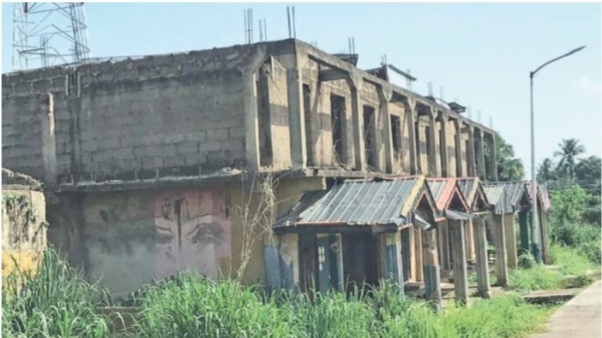By Victor Nwegede
Effium, once a bustling community in Ohaukwu Local Government Area of Ebonyi State, now lies in ruins—scarred by a four-year-long communal war that has destroyed lives, property, and the very fabric of coexistence among its people. What began as a political disagreement between two prominent sons of the land has spiraled into one of the deadliest and most protracted internal conflicts in the state’s history.
Effium was not just a community—it was an economic hub that attracted traders and buyers from neighboring states like Benue, Cross River, Enugu, Abia, Kogi among others. Its renowned market boasted of abundant agricultural produce and livestock sold at competitive prices. The town was home to thriving schools, health facilities, a court, a motor park, socio-cultural and other active civic life.
The market is no longer functional, schools and hospitals have been reduced to rubble, and what remains of homes and public buildings are burned-out shells. Once-vibrant neighborhoods have become uninhabitable. Families have been displaced, lives lost, and generations uprooted.
The current crisis was ignited on January 22, 2021, following a tussle between Clement Odah, then council chairman of Ohaukwu LGA and a native of Effium, and Chinedu Awo, then member of the Ebonyi State House of Assembly and of Ezza extraction. The dispute, was just who would control over revenues from the local market and motor park.
What began as a political rivalry quickly degenerated into clannish violence between the Effium and Ezza-Effium communities—two groups that had intermarried, lived together for decades, and shared deep ancestral roots.
Within two months of the conflict's onset, over hundreds of people had been killed. Then Vice President Prof. Yemi Osinbajo, during an Easter Sunday visit to the war-torn area on April 3, 2021, described the situation as too dire for celebration. He called on both factions to embrace peace and warned against continued bloodshed.
Now in its fourth year, the war has claimed thousands of lives and displaced tens of thousands. Properties worth billions of Naira have been destroyed, and survivors carry emotional and psychological wounds that may never heal.
Mr Monday Eze, a resident who narrowly escaped the carnage, recalled his personal losses: “I built my modest home in the village and moved in on December 29, 2020. By January 21, 2021, the war erupted. My house, my father’s, my grandfather’s, my uncle’s—all were razed. I lost everything, even my farm. I lost friends, family. The trauma was unimaginable.”
Worse still is the story of 12-year-old Chisom Nworie, an orphan who lost her entire family—father, mother, and four siblings—in the violence.
“I have no one left. I beg to survive. I can’t go back to Effium. There’s no house, no family...nothing.” Numerous victims of the war, from both Effium and Ezza-Effium clans have similar tales.
Determined to halt the carnage, Governor Francis Nwifuru formed a peace committee led by former Minister Ambassador Franklin Ogbuewu, which submitted a white paper proposing significant reforms. The governor acted swiftly.
In a bold move, he signed into law the creation of five new autonomous communities in Effium to reflect the existing wards and to facilitate governance and peace and they include Effium Autonomous Community, Ekerigwe Autonomous Community and Ejem Autonomous Community from Effium clan, and Alioma Community and Ezekuna Alioma Autonomous Community from Ezza clan.
The governor also flagged off the construction of a 25.5km demarcation road to physically separate the warring factions and announced the acquisition of the Effium market and surrounding areas as government reserve land.
He made it clear: “No one is allowed to sell or buy land or farm outside their designated communities. Any breach will be met with the full force of the law.”
However, the governor’s peace strategy has met resistance. Dr. James Agina, President General of Effium Community Town Union, declared the governor’s decision unjust and vowed to challenge it legally:
“It is unheard of to take land from indigenes and give to those seen as strangers. This decision will worsen the crisis, not end it.”
Agina questioned the neutrality of Ambassador Ogbuewu, whom he accused of being an in-law to the Ezza people and, therefore, a biased party in the conflict.
Yet, just days later, Agina made a surprising reversal. In a public statement, he urged his people to accept the government’s decision: “The governor has shown genuine commitment. We have three autonomous communities now. This is a lion’s share of the peace offer. Let us accept it and move forward.”
He warned youths and dissenters against challenging the state, saying such actions could endanger the community further.
The Effium Indigenes of Ezza-Ezekuna Extraction supported the government’s move. Their president, Chief Egbe Nwankwo, praised the creation of new communities and called for full implementation of the peace blueprint, including the prosecution of those fueling the crisis.
“The government’s action is lawful, inclusive, and aimed at restoring peace. We support it wholeheartedly.”
Immediate past Governor David Umahi of Ebonyi State during his administration responded to the communal clash by setting up peace committees and empowering religious figures like Bishop Emeritus Michael Nnachi Okoro to mediate. Despite multiple dialogues and detentions of suspected instigators, the bloodshed endured.
By implications, Effium’s tragedy is a stark reminder of how quickly political rivalry can unravel the fabric of a community. The war has left deep scars—physical, emotional, and generational. Though Governor Nwifuru’s interventions mark a new chapter in reconciliation, peace remains fragile and conditional.
Rebuilding Effium will take more than roads and laws. It will require healing, justice, and most importantly, a collective will to choose unity over division.
Until then, the ashes of Effium serve as a cautionary tale for Nigeria—and a call to action.














